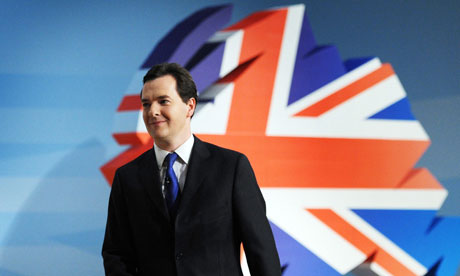Warning that £1bn cut 'misdirected' as higher-rate taxpayers with children lose at least £1,055 a year

Insisting he was making "tough but fair" reforms to tackle the national deficit, Osborne told his party conference he was withdrawing child benefit from parents earning enough to pay higher-rate tax – currently about £44,000.
It will mean a loss of £1,055 a year for one-child families and almost £2,500 for those with three children.
In an attempt to protect his rightwing flank, Osborne balanced his attack on middle-class benefits by announcing a £26,000-a-year cap on the total value of benefits received by workless households.
The changes, due to be introduced in 2013, will save the Treasury £1bn a year in child benefit and £250m in housing benefit payments as it seeks to eliminate the UK's £109bn structural deficit by the end of this parliament.
Although the prime minister, David Cameron, had warned his party that the "rubber was about to hit the road" on spending cuts, many senior backbenchers feared the manner of today's attack on child benefit was badly misdirected.
The Treasury acknowledged the cut would lead to the anomaly of a two-income family earning as much as £86,000 not losing the benefit while a family with the father earning more than £44,000 and the wife staying at home will lose all of it.
The Centre for Social Justice, the thinktank set up by the work and pensions secretary, Iain Duncan Smith, expressed "concern" at the measure and urged the government to "explore alternative options" before implementation in 2013.
The children's minister, Tim Loughton, said the benefit – to be withdrawn through the tax system – could be reinstated once the deficit is tackled. Osborne did not make this commitment himself today.
Duncan Smith said he did not love the announcement, but said the decision was necessary to raise £1bn.
Phillip Hammond, the transport secretary who insisted during the election that universal principle surrounding child benefit must be protected, admitted the cabinet had agonised about the decision.
Critics said the simplicity of the measure would bring perverse disincentives, such as the loss of £2,500 in child benefit if a family with three children were to have a rise in income of £300 from £43,500.
Hammond admitted the simple system would bring anomalies, but he said the Treasury had to choose between these and a complex system of means testing.
Osborne told his conference: "Believe me I understand that most higher-rate taxpayers are not the super rich.
"But a system that taxes working people at high rates only to give it back in child benefit is very difficult to justify at a time like this. And it is very difficult to justify taxing people on low incomes to pay for the child benefit of those earning so much more than them. When the debts left by Labour threaten our economy, when are welfare costs are out of control, this measure makes sense."
Treasury sources refused to guarantee there will not be more cuts to universal benefits, such as the winter fuel allowance, when the spending review is announced on 20 October. It is expected the government will raise the age at which the allowance can be claimed.
The cap on benefits – likely to raise £300m – is seen as a vote winner but prompted warnings from housing charities of an exodus of the poor from southern inner cities as the 50,000 affected families face benefit cuts worth an average of £93 a week. Shelter said the poor would simply not have the cash to pay high cost rents in the private rented sector.
But Osborne drew applause at the conference for warning the welfare budget had to be brought under control. He said: "If this welfare state is going to gain the trust of the British people, it needs to reflect the British sense of fair play. Unless they have disabilities to cope with, no family should get more from living on benefits that the average family gets from going out to work. If someone believes that living on benefits is a lifestyle choice we need to make them think again."
The shadow work and pensions secretary, Yvette Cooper, said: "Instead of boosting jobs and growth, the government is making families with children pay more.
"We support child benefit for all children and all families. Of course there are difficult choices to make and we need more welfare reform, but it's better to get the economy growing faster and raise more tax from the banks than to cut support for children in middle income families."
The decision on child benefit was defended by senior Lib Dems even though at their conference a fortnight ago they voted to protect child benefit.
TUC general secretary, Brendan Barber, said: "Everyone can agree that we need a fairer economy built on higher, better balanced growth. But the spending and benefit cuts will do the opposite – pushing many people into poverty, hitting middle income Britain hard and threatening growth. The language may be different, but the policies are all too reminiscent of the 1980s."
Source
No comments:
Post a Comment